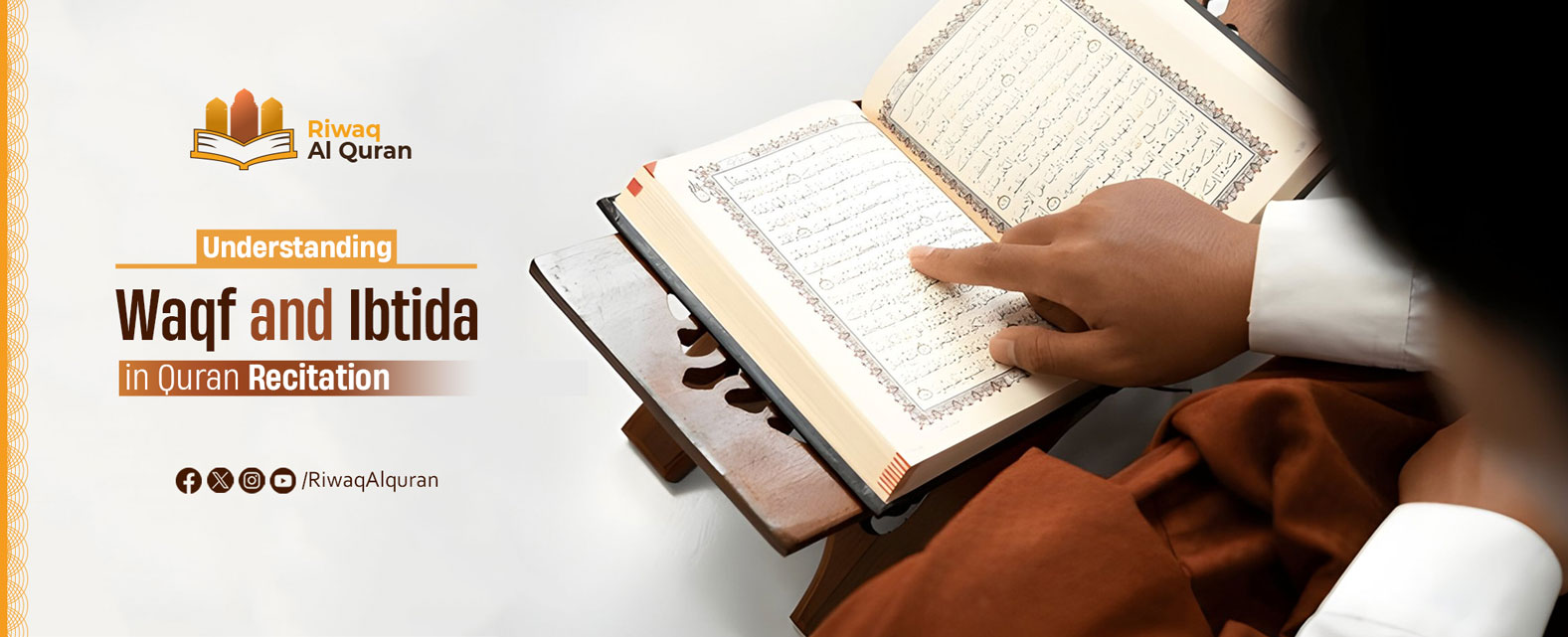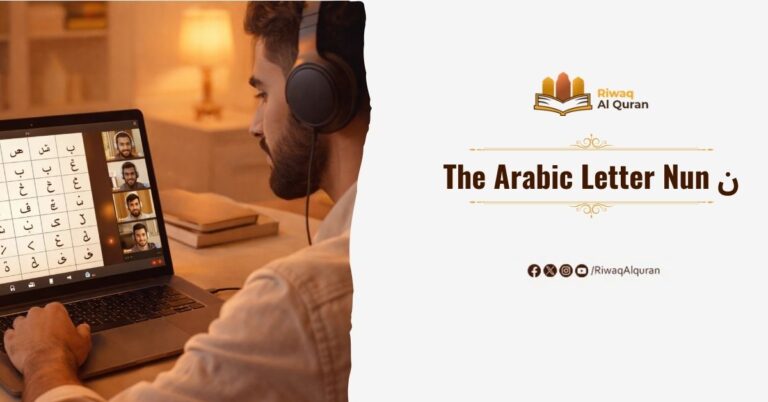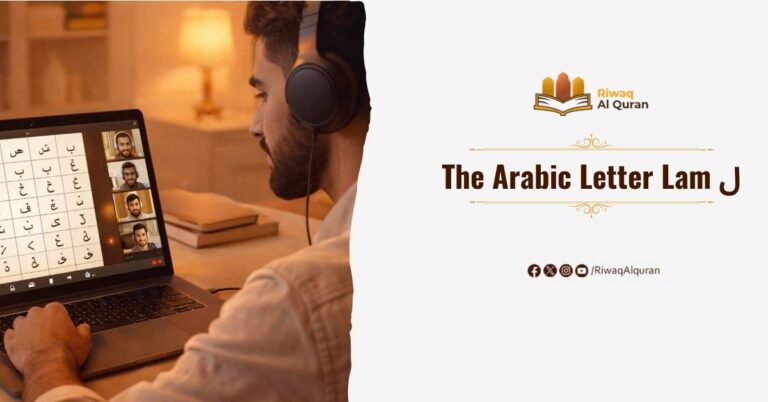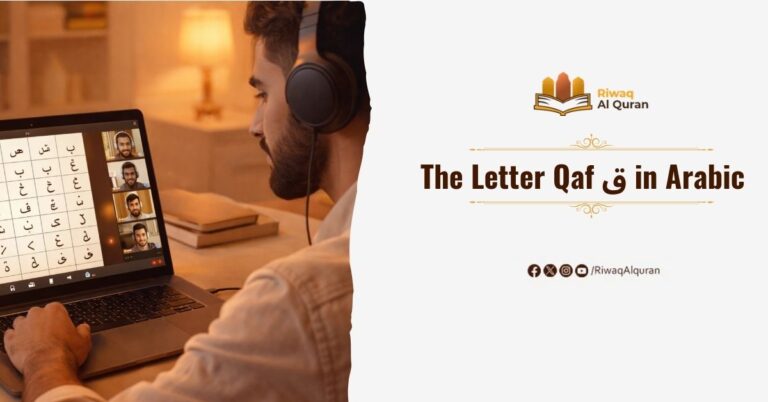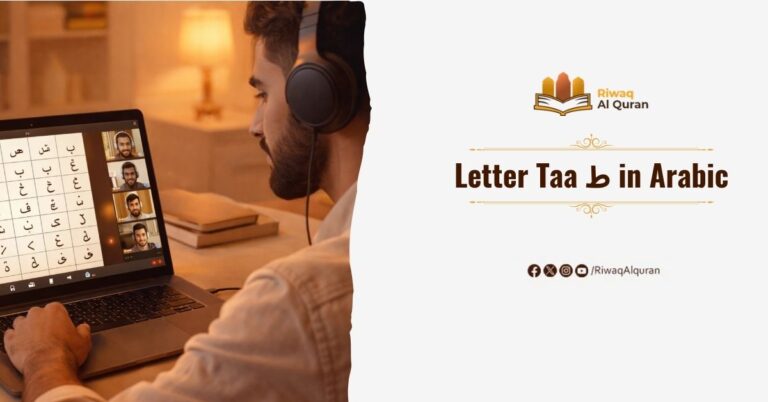Waqf and Ibtida work together to guide the rhythm and meaning of Quranic recitation. Waqf is the act of pausing at specific points in the recitation to reflect proper meaning, while Ibtida refers to starting again after the pause. There are seven types of Waqf and Ibtida, such as mandatory and prohibited stops, indicated by symbols like “مـ” and “لا”.
Tajweed is the art and science of reciting the Quran properly and beautifully. Tajweed is part of Tarteel (الترتيل). Waqf and Ibtida (Stop and Start anew) are Islamically considered half of the Tarteel (الترتيل) rules. This will be discussed in some detail in this article.
Below, we will mainly examine Waqf and Ibtida as some of the basic Tarteel rules. We will talk about the meaning of these two terms in Arabic and English. We will also discuss types of Waqf in Tajweed as well as Waqf and Ibtida in the Quran with examples. Also, the importance and benefits of learning Waqf and Ibtida will be elaborated. Then, we will refer to how many Waqf are there in the Quran.
Table of Contents
The Meaning Of Waqf And Ibtida
Waqf and Ibtida are essential concepts in Quranic recitation, guiding when to pause and when to begin anew to preserve the meaning and flow of the verses. In other words, Waqf involves pausing at certain points during recitation to convey the correct meaning, while Ibtida refers to resuming the recitation after the pause. Correct use of Waqf and Ibtida ensures the proper meaning of the Quran is conveyed, avoiding misinterpretation.
Waqf and Ibtida are two important terms that possess high value and significance as far as reciting and perfecting the Quran are concerned. A prominent Muslim linguist [Ibn Al-Anbari – ابن الأنباري] once said:
“من تمام معرفة القرآن: معرفة الوقف والابتداء فيه”.
[An essential part of learning the Quran is to learn Waqf and Ibtida.]
Waqf Meaning:
Waqf (Arabic: وقف) means “to stop”. In essence, Waqf refers to specific types of pauses or stops that a Quran reciter makes during the recitation of the Quran. There are seven types of Waqf in the Quran, and we shall briefly examine them with examples from the Quran. The opposite of Waqf is Ibtida. Let’s see what the meaning of Ibtida is.
Ibtida Meaning:
Ibtida is another crucial concept in Tarteel. So now, let’s see what the term “Ibtida” means in Arabic and English.
Ibtida Meaning In Arabic:
In Arabic, the term
“Ibtida (ابتداء) means to start to recite after a pause or stop, either with the word following the one that had Waqf, the word before it, or the word that had Waqf itself.”:
“الشروع في القراءة بعد وقف أو قطع، بما يلي الكلمة التي وُقِف عندها أو بما قبلها أو بها هي نفسها”.
Ibtida Meaning In English:
The word Ibtida is the opposite of Waqf (stop) (in Arabic: وقف), but is not exactly the same as “start” (بدء). The exact meaning of Ibtida is beginning anew; i.e. to start anew after pausing or stopping while reciting. It indicates the start of a new section or a new idea.
Unlike Waqf, Ibtida is always a decision, because the reciter CAN choose the point to start from after Waqf [stop]. For example:
“وَمَآ أُمِرُوٓا۟ إِلَّا لِيَعْبُدُوا۟ ٱللَّهَ مُخْلِصِينَ لَهُ ٱلدِّينَ حُنَفَآءَ وَيُقِيمُوا۟ ٱلصَّلَوٰةَ وَيُؤْتُوا۟ ٱلزَّكَوٰةَ ۚ وَذَٰلِكَ دِينُ ٱلْقَيِّمَةِ”
[Even though they were only commanded to worship Allah ˹alone˺ with sincere devotion to Him in all uprightness, establish prayer, and pay alms-tax. That is the upright Way.]
A reciter can stop (make Waqf) at “مُخْلِصِينَ لَهُ ٱلدِّينَ” or at “حُنَفَآءَ” if they are out of breath [Note that “حُنَفَآءَ” has 4 harakat of Madd which also takes from the breath]. However, the reciter, then, can choose where to start anew. A good point to start from here is “مُخْلِصِينَ لَهُ ٱلدِّينَ”.


Waqf And Ibtida In The Quran With Examples
Waqf and Ibtida are essential concepts for proper Quranic recitation, as they help to maintain the correct meaning and intent of the verses of the Quran.
For example, it was narrated that one of the Muslim scholars called Al-Sha’by (الشعبي) once said:
إذا قرأت: ﴿ كُلُّ مَنْ عَلَيْهَا فَانٍ ﴾ [الرحمن:26]، فلا تسكت حتى تقرأ: ﴿ وَيَبْقَى وَجْهُ رَبِّكَ ذُو الْجَلَالِ وَالْإِكْرَامِ ﴾ [الرحمن: 27].
[If you recite:
“كُلُّ مَنْ عَلَيْهَا فَانٍۢ” (Every being on earth is bound to perish),
do not make Waqf until you recite
“وَيَبْقَىٰ وَجْهُ رَبِّكَ ذُو ٱلْجَلَـٰلِ وَٱلْإِكْرَامِ” (Only your Lord Himself,1 full of Majesty and Honour, will remain ˹forever˺)] (The Quran, 55:26-27)
Although these are 2 separate verses, and it is Sunnah to stop at the end of each verse and start anew (make Ibtida) with the following one, here, at this specific position, it is Sunnah NOT to stop after the first verse. Let’s see why.
The reason for reciting them as one complete unit is to keep the intended meaning, which is a clear comparison: it is a comparison between Allah who is All-Living (He has always been there and will always be there), and his creation [everything except Allah] (who are all to come to an end). It is a reality that needs to be highlighted as one shot.
Read more about What Do The Signs ط – لا – ج – م Mean In The Quran?
Experience Riwaq Al Quran Classes
Watch real moments from our live sessions at Riwaq Al Quran and see how we bring learning to life. These clips highlight our interactive, student-focused approach designed to keep learners engaged, motivated, and actively involved in every step of their educational journey.
Types Of Waqf In Tajweed [Waqf In The Quran With Examples]
Waqf [stop] is a vital concept in Tarteel of the Quran. Tajweed stop signs [Waqf signs] are marks that designate particular places in the Quranic recitation where a halt or stop can be/must be/must never be made. There are seven stop signs in the Quran.
Tajweed stop signs [aka Waqf signs] are symbols used to indicate when to pause or stop during recitation. These signs are crucial for understanding the correct meaning and intent of the verses.
Here are seven common Tajweed Stop signs:

1- Mandatory Waqf [مـ]:
Mandatory Waqf means that the reader should stop at the word and start with the next word. It has the symbol of a little “مـ” above the word. For instance:
“إِنَّمَا يَسْتَجِيبُ الَّذِينَ يَسْمَعُونَ ۘ وَالْمَوْتَىٰ يَبْعَثُهُمُ اللَّهُ ثُمَّ إِلَيْهِ يُرْجَعُونَ”
Here, a reciter MUST make Waqf after “يَسْمَعُونَ” and then make Ibtida from “وَالْمَوْتَىٰ…”.
2- Prohibited Waqf [لا]:
It means that Waqf is prohibited at this site due to the incomplete meaning of the verse or because Waqf at that place will entail an incorrect meaning. It is symbolized by a little “لا” above the site. For example:
“ٱلَّذِينَ تَتَوَفَّىٰهُمُ ٱلْمَلَـٰٓئِكَةُ طَيِّبِينَ ۙ يَقُولُونَ سَلَـٰمٌ عَلَيْكُمُ ٱدْخُلُوا۟ ٱلْجَنَّةَ بِمَا كُنتُمْ تَعْمَلُونَ”
After reciting “طَيِّبِينَ”, the reader must not make Waqf, but rather continue till the end of the verse, so that the meaning is preserved.
3- Permissible Waqf [ج]:
The reader is allowed either to complete their recitation or make Waqf at that word. A little “ج” appears above the word. For example:
“فَسَبِّحْ بِحَمْدِ رَبِّكَ وَاسْتَغْفِرْهُ ۚ إِنَّهُ كَانَ تَوَّابًا”
After reciting the word “وَاسْتَغْفِرْهُ”, the reader can continue or make Waqf. They have both options.
4- Better to continue [صلى]:
It is preferred to continue your recitation. The sign “صلى” appears above the word, such as:
“كَلَّا ۖ لَيُنبَذَنَّ فِي الْحُطَمَةِ”
After the word “كَلَّا”, the reader can make Waqf or continue. However, it is better to continue.
5- Better To Make Waqf [قلى]:
Waqf is preferred. This is symbolized by the sign “قلى”. For example:
“قُل رَّبِّىٓ أَعْلَمُ بِعِدَّتِهِم مَّا يَعْلَمُهُمْ إِلَّا قَلِيلٌۭ ۗ فَلَا تُمَارِ فِيهِمْ إِلَّا مِرَآءًۭ ظَـٰهِرًۭا”
After the word “قَلِيل”, the reciter can make Waqf or continue. However, it is better to make Waqf.
6- Waqf At Only One Of The Two Signs, Not At Both:
It means you can only make Waqf at ONE of the two signs, but not at both. For example:
“ذَٰلِكَ ٱلْكِتَـٰبُ لَا رَيْبَ ۛ فِيهِ ۛ هُدًۭى لِّلْمُتَّقِينَ”
The signs after “ريب” and after “فيه”, indicate that you can either recite “ذَٰلِكَ ٱلْكِتَـٰبُ لَا رَيْبَ”, then make Waqf and then make Ibtida reciting “فِيهِ هُدًۭى لِّلْمُتَّقِينَ” OR you can recite “ذَٰلِكَ ٱلْكِتَـٰبُ لَا رَيْبَ ۛفِيهِ” and then make Waqf and then make Ibtida reciting “هُدًۭى لِّلْمُتَّقِينَ”.
7- Sakt Sign [س]
It refers to a short pause the reader does during recitation without taking a breath. It is denoted by a little “س” above the word. For example:
“وَقِيلَ مَنْ ۜ رَاقٍ”
In this verse, a reciter should make Waqf after “وَقِيلَ مَنْ” for a very short time without taking a breath and then make Ibtida reciting “رَاقٍ”.
Read more about What Is Harakat In Tajweed And Arabic? Meaning, Types, Examples, And Common Mistakes
Types Of Ibtida In Tajweed [Ibtida In The Quran With Examples]
Ibtida has two main types in the Quran: Permissible and Impermissible. The Permissible type has 3 sub-categories: Complete (تام), Sufficient (كاف), and Acceptable (حسن). Let’s see these types and sub-categories, in some detail, with examples from the Quran.
A. Permissible Ibtida:
As the name tells, it means that the reciter can safely start anew from the said point. The permissible type has 3 sub-categories:
1- Complete Ibtida (تام):
It is done when the section is not connected with what is mentioned before it, in meaning or in words. For example:
“إِنَّ ٱلَّذِينَ ءَامَنُوا۟ وَعَمِلُوا۟ ٱلصَّـٰلِحَـٰتِ كَانَتْ لَهُمْ جَنَّـٰتُ ٱلْفِرْدَوْسِ نُزُلًا”
[Indeed, those who believe and do good will have the Gardens of Paradise as an accommodation.]
The only rule here is to start anew with this verse because it is completely about a new idea. The previous idea about the disbelievers and their punishment is already finished in the previous verse:
“ذَٰلِكَ جَزَآؤُهُمْ جَهَنَّمُ بِمَا كَفَرُوا۟ وَٱتَّخَذُوٓا۟ ءَايَـٰتِى وَرُسُلِى هُزُوًا” [That is their reward: Hell, for their disbelief and mockery of My signs and messengers.] (the Quran, 18:106).
2- Sufficient Ibtida (كاف):
It is made when the section is connected with what is mentioned before it, in meaning only.
The examples of this type are hard to count in the Quran. The following is just one of them:
“خَتَمَ ٱللَّهُ عَلَىٰ قُلُوبِهِمْ وَعَلَىٰ سَمْعِهِمْ ۖ وَعَلَىٰٓ أَبْصَـٰرِهِمْ غِشَـٰوَةٌۭ ۖ وَلَهُمْ عَذَابٌ عَظِيمٌۭ”
[Allah has sealed their hearts and their hearing, and their sight is covered. They will suffer a tremendous punishment.]
In this verse, it is allowed to start anew (make Ibtida) from “وَلَهُمْ عَذَابٌ عَظِيمٌ” after making Waqf at “غِشَـٰوَةٌۭ”.
3- Acceptable Ibtida (حسن):
It is done when the section is connected with what is mentioned before it, both in meaning and in words.
“وَمِنَ ٱلنَّاسِ مَن يَقُولُ ءَامَنَّا بِٱللَّهِ وَبِٱلْيَوْمِ ٱلْـَٔاخِرِ وَمَا هُم بِمُؤْمِنِينَ (8) يُخَـٰدِعُونَ ٱللَّهَ وَٱلَّذِينَ ءَامَنُوا۟ وَمَا يَخْدَعُونَ إِلَّآ أَنفُسَهُمْ وَمَا يَشْعُرُونَ (9)”
[And there are some who say, “We believe in Allah and the Last Day,” yet they are not ˹true˺ believers. (8) They seek to deceive Allah and the believers, yet they only deceive themselves, but they fail to perceive it. (9)]
Here, it is fine to start anew (make Ibtida) with verse 9 “…يُخَـٰدِعُونَ ٱللَّهَ وَٱلَّذِينَ ءَامَنُوا۟” [They seek to deceive Allah and the believers…] as the meaning is preserved, although it is connected with the previous verse (8), both in meaning and in words.
B. Impermissible Ibtida:
This type of Ibtida is not allowed, either for giving an inaccurate/wrong meaning or incomplete/ambiguous meaning:
1- Ibtida leading to an Inaccurate/Wrong Meaning:
It is not allowed for the reciter to make Waqf and Ibtida at certain positions in the Quran if those Waqf and Ibtida will automatically lead to inaccurate/wrong meaning. For example:
“لَقَدْ كَفَرَ ٱلَّذِينَ قَالُوٓا۟ إِنَّ ٱللَّهَ هُوَ ٱلْمَسِيحُ ٱبْنُ مَرْيَمَ”
[Those who say, “Allah is the Messiah, son of Mary,” have certainly fallen into disbelief.]
Here, a reciter is NOT allowed to make Waqf at “لَقَدْ كَفَرَ ٱلَّذِينَ قَالُوٓا” and then make Ibtida with “إِنَّ ٱللَّهَ هُوَ ٱلْمَسِيحُ ٱبْنُ مَرْيَمَ” [Allah is the Messiah, son of Mary]. This is like a confirmation that “Allah is the Messiah, son of Mary”, while the intended meaning is the complete opposite.
2- Ibtida leading to An Incomplete/Ambiguous Meaning:
It is also not allowed for the reader of the Quran to make Waqf and Ibtida at certain points in the Quran if those Waqf and Ibtida will automatically lead to incomplete/ambiguous Meaning. For example:
“تَبَّتْ يَدَآ أَبِى لَهَبٍۢ وَتَبَّ”
[May the hands of Abu Lahab perish, and he ˹himself˺ perish!]
Here, a reciter is NOT allowed to stop (make Waqf) at “تَبَّتْ يَدَآ” [May the hands] and then start anew (make Ibtida) with “أَبِى لَهَبٍۢ وَتَبَّ” [Abu Lahab perish, and he ˹himself˺ perish]. This is because the phrase will be incomprehensible and ambiguous as it is incomplete.
Importance And Benefits Of Learning Waqf And Ibtida
As we have already established, Waqf and Ibtida are very important while reciting the Quran. Understanding and applying these concepts can lead to numerous benefits. To name but a few:
1- Learning Waqf And Ibtida Equals Half Of Learning Tarteel:
There is a direct command from Allah to recite the Quran properly [make Tarteel].
Allah says:
“Recite the Quran ˹properly˺ in a measured way”
“وَرَتِّلِ ٱلْقُرْءَانَ تَرْتِيلًا”
Here, Allah commands Prophet Muhammad (peace be upon him) and, by extension, the believers, to recite the Quran “properly“.
According to Ali Ibn Abi-Talib [one of the Ten Companions Promised Paradise], Waqf and Ibtida (Stop and Start anew) rules are considered half of Tarteel (الترتيل) which is composed of “Tajweed of letters” and “knowledge of Waqf” (stopping points). That’s why learning Waqf and Ibtida is part and parcel of learning the Quran.
2- Not Learning Waqf Is A Terrific Danger while Reciting the Quran:
By pausing at the right points (Waqf) and starting new sections appropriately (Ibtida), reciters can prevent misunderstandings and misinterpretations of the Quran. That’s why Another prominent Muslim scholar once said:
“باب الوقف عظيم القدر، جليل الخطر”.
[Waqf is an issue of great significance and terrific danger.]
The reason for this is that not learning Waqf and Ibtida can lead to misunderstanding of some verses of the Quran and even introducing improper attributes of Allah, Almighty. A clear example of this is:
“إِنَّ ٱللَّهَ لَا يَسْتَحْىِۦٓ أَن يَضْرِبَ مَثَلًۭا مَّا بَعُوضَةًۭ فَمَا فَوْقَهَا”
[Surely Allah does not shy away from using the parable of a mosquito or what is even smaller.]
In this part of the verse, it is not allowed to recite “إِنَّ ٱللَّهَ لَا يَسْتَحْىِ“ [Surely Allah does not shy away] and make Waqf after “يَسْتَحْىِ”. This will give a completely incorrect meaning. Here, you should recite “إِنَّ ٱللَّهَ لَا يَسْتَحْىِۦٓ أَن يَضْرِبَ مَثَلًۭا مَّا بَعُوضَةًۭ فَمَا فَوْقَهَا” [Surely Allah does not shy away from using the parable of a mosquito or what is even smaller] as ONE complete unit.
How Many Waqf In the Quran?
Determining the exact number of Waqf in the Quran is a complex task. While there is not a definitive answer, it is estimated that there are thousands of Waqf throughout the Quran. However, the exact number cannot be told.
But it is noteworthy that the focus of Quranic recitation is not solely on counting Waqf. The primary goal here is to understand and convey the message and teachings of the Quran accurately and beautifully. The proper use of Waqf is a means to achieve this goal and not a goal in itself.


Why Students Love Learning with Riwaq Al Quran
Hear directly from our students about how Riwaq Al Quran Academy has transformed their connection with the Book of Allah. Their experiences reflect the dedication, care, and quality that guide every step of our teaching.
Learn Quran, Arabic, And Islamic Studies Online With The Best Native Tutors
Riwaq Al Quran is a comprehensive online platform that offers personalized Quran, Arabic, and Islamic Studies Online classes for individuals of all ages and backgrounds.
Their experienced instructors use a structured curriculum to cover Tajweed, Tafsir, and Memorization, providing easy and effective access to learning the Quran.
The advanced online classes allow for seamless communication and interaction between students and teachers. Join Riwaq Al Quran for a deeper connection with the Quran.
We offer several courses such as:
- Online courses for kids.
- Online Quran classes for kids and adults.
- Online Arabic courses
- Online Ijazah courses
- Online Islamic Studies courses.
Here are a sample of our set of Quran Courses that will be helpful for you:
- Online Tafseer Course: Delve into Quranic meanings with our insightful online Tafseer course.
- Noorani Qaida Online: Learn Quranic basics efficiently through our Noorani Qaida online program.
- Online Quran Recitation Course: Enhance Quranic recitation skills through our expert-led online course.
- Online Tajweed Classes: Master Tajweed rules for beautiful Quranic recitation in online classes.
- Quran Memorization Online Course: Memorize the Quran effectively with our specialized online memorization course.
- Online Qirat Course: Explore diverse Qirat styles with our comprehensive online Qirat course.
- Online Quran Classes for Kids: Nurture a love for the Quran in kids through interactive online classes.
Conclusion
To sum up, Waqf and Ibtida are two fundamental concepts in Tarteel, that play a crucial role in the proper recitation of the Quran. It is not possible to learn how to recite the Quran accurately without learning Waqf and Ibtida.
So learning and applying Waqf and Ibtida are essential for achieving a beautiful, meaningful, and spiritually uplifting recitation of the Quran. By mastering these concepts, reciters can not only preserve the Quranic message but also enhance their own spiritual growth and be more connected to the Quran, the final word of Allah.

